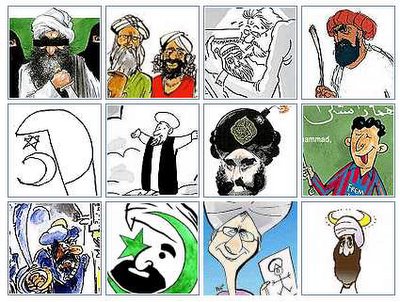
The world is learning a potent lesson about the power of certain religious imagery as violent and deadly demonstrations continue to erupt over European newspaper cartoons depicting the Islamic Prophet Muhammad as a terrorist. The episode also underscores how little many non-Muslims know about Islam and how little agreement there is among Muslim’s over Muhammad’s place within Islam.
So what do the scholars say about those images? What do they represent and why have they incited such reactions? In short, most experts say it is clear that religious sensibilities are at the heart of the uproar and scholars offer the following suggestions for contextualizing the cartoons.
- Islam sternly prohibits images of God and his prophets. Islamic scholars say, however, that images of Muhammad can be found in markets in Shiite Iran, Egypt and South Asia, and that the current controversy has more to do with the characterization of Muhammad. (The Bible contains a prohibition against "graven images" in the Ten Commandments (see Exodus 20:4). Religioustolerance.org offers a comparison of the Ten Commandments in the Bible with similar passages in the Quran.)
- Religious scholars say Muhammad himself has not been a source of controversy within Islam or between Islam and other religions for centuries. Islam's controversies have primarily arisen over interpretations of the Quran - the words revealed to God by Muhammad - and over issues of who has authority to speak for Islam.
- Debate also arises over sayings of Muhammad outside the Quran. Historian Bernard Lewis noted in his 2002 book The Crisis of Islam that there is a saying attributed to the prophet that not all scholars believe is valid: "If anyone insults me, then any Muslim who hears this must kill him immediately." Osama bin Laden's belief that Muslims have a duty kill Americans is based partly on this saying, coupled with his belief that all Americans insult Muhammad because of the actions of the U.S. government and the nature of U.S. society, scholars say.
- Starting with Muhammad, who experienced success as a merchant, warrior and statesman, Islam has had a history of inspiring followers to feel bound by religious fellowship that transcends national loyalties.
For more on this see here.
Unlike Muhammad who claims to be a human messenger of God who lived the Quran, Jesus was the Word of God made flesh (John 1.1-14) who perfectly fulfilled the Holy Scripture.
1 comment:
Sahih Al-Bukhari HadithHadith 7.840 Narrated by Aisha: I purchased a cushion with pictures on it. The Prophet (came and) stood at the door but did not enter. I said (to him), "I repent to Allah for what (the guilt) I have done." He said, "What is this cushion?" I said, "It is for you to sit on and recline on." He said, "The makers of these pictures will be punished on the Day of Resurrection and it will be said to them, 'Make alive what you have created.' Moreover, the angels do not enter a house where there are pictures.'"
Post a Comment